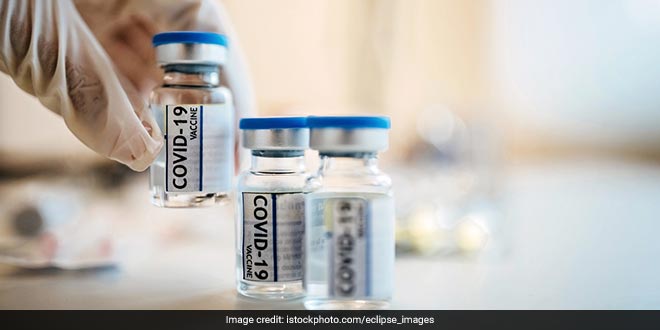Highlights
- Both the doses need to be of the same vaccine type, mixing not allowed
- The second dose of Covishield is given after 12 weeks from the first dose
- A gap of 4-6 weeks is to be maintained between the two doses of Covaxin
New Delhi: The Government of India on Tuesday (June 1) clarified that mixing of COVID-19 vaccines is not protocol yet and asserted there is no change in the schedule of two-dose vaccines Covishield and Covaxin. Briefing a press on Covid and vaccination-related updates in the country, Chair of the National Expert Group on Vaccine Administration for COVID-19 (NEGVAC) and Member (Health) in NITI Aayog, Dr Vinod K Paul, said “We have heard that, it is being said that now only one dose of Covishield would be given. I would like to clarify that only two doses of Covishield are scheduled in India. After the first Covishield dose is administered, the second dose will be given after 12 weeks. There is no change. The same schedule is applicable to Covaxin. First dose and the second dose after four to six weeks,” he said.
Also Read: Sputnik V COVID-19 Vaccine To Be Rolled Out Across Apollo Hospitals, Will Cost Rs. 1,195 Per Dose
Second thing which has come is the mixing of the vaccine. Mixing of vaccine is not the protocol yet, the same vaccines (Covishield and Covaxin) to be administered for both doses. Stick to the SOP, he added.
“There is international research underway on the mixing of vaccines as the possibility of a positive effect is also plausible but a harmful reaction cannot be ruled out either. It is an unresolved scientific question, science will settle it,” he added.
Earlier, Dr N K Arora, Chairman of COVID-19 working group under the National Technical Advisory Group on Immunisation (NTAGI) said that India may in few weeks start testing the feasibility of a regimen that mixes two different doses of Covid vaccines to see if it helps boost the immune response to the virus. The mixing of vaccine of Covid-19 has been discussed at the Covid-19 group, NTAGI and National Expert group on Covid-19 Vaccine Administration (NEGVAC). During the press briefing today, Lav Agarwal, Joint Secretary, Health Ministry said, “1,27,000 cases have been reported in the last 24 hours. Since May 28, the country is reporting less than 2 lakh cases. There is a decline of infection in the country.”
Active cases are down by 50 per cent, 1.3 lakh decrease in active cases in a day. In 30 states/UT, cases have been consistently declining for one week, it is a positive trend, he added.
(Except for the headline, this story has not been edited by NDTV staff and is published from a syndicated feed.)
NDTV – Dettol Banega Swasth India campaign is an extension of the five-year-old Banega Swachh India initiative helmed by Campaign Ambassador Amitabh Bachchan. It aims to spread awareness about critical health issues facing the country. In wake of the current COVID-19 pandemic, the need for WASH (Water, Sanitation and Hygiene) is reaffirmed as handwashing is one of the ways to prevent Coronavirus infection and other diseases. The campaign highlights the importance of nutrition and healthcare for women and children to prevent maternal and child mortality, fight malnutrition, stunting, wasting, anaemia and disease prevention through vaccines. Importance of programmes like Public Distribution System (PDS), Mid-day Meal Scheme, POSHAN Abhiyan and the role of Aganwadis and ASHA workers are also covered. Only a Swachh or clean India where toilets are used and open defecation free (ODF) status achieved as part of the Swachh Bharat Abhiyan launched by Prime Minister Narendra Modi in 2014, can eradicate diseases like diahorrea and become a Swasth or healthy India. The campaign will continue to cover issues like air pollution, waste management, plastic ban, manual scavenging and sanitation workers and menstrual hygiene.
[corona_data_new]





























